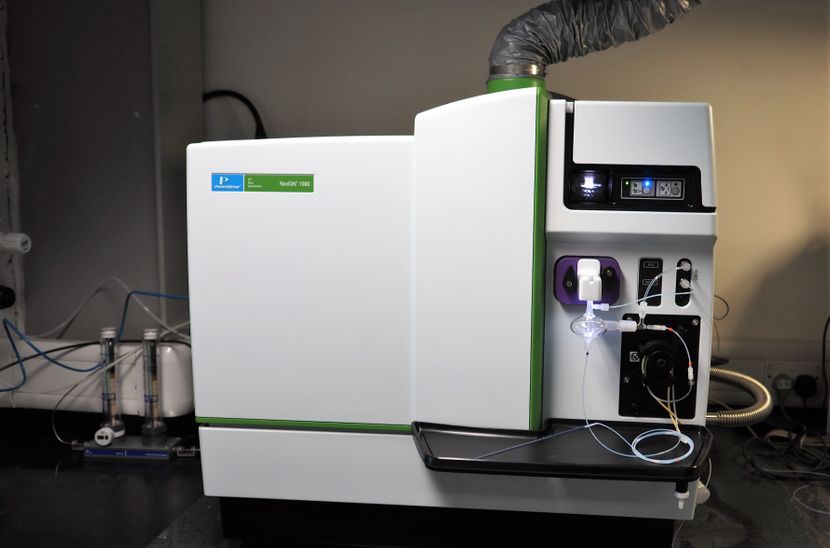What is ICP-MS?
Published: 15th March 2019

By Dr Belen Morales, Head of Analytical Services
Inductively Coupled Mass Spectrometry (ICP-MS) is an instrumental technique which was first introduced in the early 1980’s to determine elemental content of water samples at trace levels. Over recent years new developments have eliminated the original disadvantages and expanded its use to a broad range of industries such as: Environmental, Medical, Pharmaceutical, Food, Agriculture, Metal Manufacturing, Geological, Nuclear, Forensics, Semiconductor, Chemical and Petrochemical.
ICP-MS uses a high ionization energy (plasma) to produce elemental ions from liquid samples. These positive ions are separated and quantified based on their mass to charge ratio using a mass spectrometer.
There are five stages during ICP-MS analysis:
1. Sample Introduction
Liquid or digested samples are converted into an aerosol using a nebulizer which sprays directly into a cyclonic spray chamber. This allows a considerable number of smaller droplets to enter the torch while discarding the larger droplets which can cause difficulties if allowed to pass into the torch.
2. Ion Generation
The plasma is generated by passing argon gas through a quartz torch. Wrapped around the torch is a radio frequency (RF) coil, which has a high power, high frequency electric current passed through it. The current creates an intense magnetic field which enables collisions between free electrons and argon atoms to occur generating the plasma (7500 K). When exposed to the plasma the aerosol sample is dried, decomposed, vaporized, atomised and then ionised.
3. Ion Focusing
A series of cones are present at the interface each with very small orifices (1mm). Depending on the design of the instrument the ions can then enter directly into the vacuum or are focused through a series of electrostatic lenses into a compact beam. Both of these factors enable the ions to pass from atmospheric pressure in the plasma to very low pressure in the filtering quadrupole.
4. Vacuum
The vacuum ensures the ions do not collide with any gas molecules during the journey from the interface to the detector. This is achieved through the use of a turbo-molecular pump and a roughing pump.
5. Ion separation and measurement
The most common mass analyser used is the quadrupole which uses a combination of direct (DC) and alternating current (AC) electrical fields to separate ions based on their mass to charge ratio (m/z). The ratio of DC and AC electrical fields are fixed but the voltages can be changed to suit each m/z value. The quadrupole scans rapidly across the mass range passing each mass of interest sequentially to the electron multiplier detector.
Advantages of using ICP-MS for Elemental Analysis;
- Excellent detection limits
From low parts per million (mg/kg or mg/l) to parts per trillion (ppt) depending on the sample matrix.
- High sensitivity
Mass/charge filtering reduces background interferences compared with other techniques that filter elements based on different principles.
- Fast analysis times
Sequentially analyses elements in a sample quickly (0.1 second per analyte) due to the high speed scanning quadrupole analyser.
- Diversity sample nature
More recent developments to ICP-MS technology now allow the instrument to analyse a variation of sample types including dissolved solids. Samples with more complex matrices can still be analysed with the use of collision or reaction gases along with high dilutions of the sample.
Analytical Services ICP-MS Service
- A personalised and confidential service that responds sensitively to the customer’s requirements with a variety of turnaround times.
- More than 35 years operation as a UKAS accredited Laboratory.
- Experienced in method validation, long-term stability studies and research.
Our Current Testing
- Food/Agricultural Testing - Food flavourings, pet feeds and bedding.
- Healthcare and Cosmetics -Cell culture mediums, medical dressings, E-cigarettes, bone substitute and heavy metals testing.
- Chemical- Inks, oils and synthetic compounds for medicinal chemistry and organic electronics.
- Metals - Alloys and pure metals for trace contents.
- Jewellery and toys - Test methods and tolerances in accordance with REACH regulation and USA procedures.
Contact us
To speak to our Analytical Team about our current testing or any new testing enquiries please do not hesitate to contact us using the details below:
Email: analytical@assayoffice.co.uk
Tel: 0114 2312121
The Sheffield Assay Office was established in 1773, under an Act of Parliament and today the company assays and hallmarks the precious metals - silver, gold, platinum and palladium. Sheffield Assay Office is one of only four UK assay offices who all work to uphold the Hallmarking Act of 1973 and continue to ensure consumer protection for customers purchasing precious metals.
To find out more about the whole range of services offered by Sheffield Assay Office, such as our hallmarking and analytical services, please email us at info@assayoffice.co.uk or complete the contact form on our website at http://www.assayoffice.co.uk/contact-us ,
Sign up here to all the latest news from Sheffield Assay Office direct to your inbox